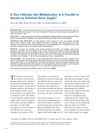 2 citations,
January 2022 in “International Journal of Medical Sciences”
2 citations,
January 2022 in “International Journal of Medical Sciences” Kartogenin may help treat hair loss by promoting hair growth and extending the hair growth phase.
 1 citations,
January 2024
1 citations,
January 2024 CaBP1 and CaBP2 are necessary for proper hearing and neurotransmission in the ear's inner hair cells.
 December 2024 in “International Journal of Molecular Sciences”
December 2024 in “International Journal of Molecular Sciences” Linoleic acid is important for healthy skin and hair.
 April 2024 in “Skin appendage disorders”
April 2024 in “Skin appendage disorders” Environmental pollutants can damage hair health and cause hair loss.
March 2024 in “International journal of molecular sciences” The research identified key proteins that affect wool fiber thickness in Angora rabbits.

CaBP1 and 2 are important for maintaining the activity of calcium channels necessary for hearing in inner ear cells.

CaBP1 and CaBP2 are necessary for proper hearing and neurotransmission in the ear's inner hair cells.

Justicia procumbens extract may help prevent hair loss and improve hair thickness and shine in a type of hair loss condition.
Ganoderma Lucidum extract and ganoderic acid A can help prevent hair loss.
June 2013 in “International Journal of Dermatology” Central lipohypertrophy in HIV-infected women may lead to shorter eyelashes.
 November 2006 in “Dermatologic Surgery”
November 2006 in “Dermatologic Surgery” Cutting hair follicles into pieces for transplantation results in poor growth and thinner hair, and the technique is more invasive than previously thought.
 185 citations,
December 2011 in “Molecular and cellular endocrinology”
185 citations,
December 2011 in “Molecular and cellular endocrinology” Skin cells produce and activate vitamin D, which regulates skin functions and supports hair growth.
 37 citations,
March 2018 in “Trends in Plant Science”
37 citations,
March 2018 in “Trends in Plant Science” pH, calcium, and reactive oxygen species regulate plant cell growth, with key roles for NADPH oxidases and plasma membrane H+-ATPases.
 27 citations,
April 2017 in “British Journal of Dermatology”
27 citations,
April 2017 in “British Journal of Dermatology” Hair loss involves immune responses, inflammation, and disrupted signaling pathways.
 26 citations,
August 2018 in “American Journal of Clinical Dermatology”
26 citations,
August 2018 in “American Journal of Clinical Dermatology” Hair loss in cancer patients can be related to the cancer itself, treatment, or other conditions, and understanding it is important for diagnosis and patient care.
 22 citations,
July 2003 in “Military medicine”
22 citations,
July 2003 in “Military medicine” New treatments are available for managing ingrown hair inflammation.
 21 citations,
April 2019 in “Clinical, cosmetic and investigational dermatology”
21 citations,
April 2019 in “Clinical, cosmetic and investigational dermatology” The document concludes that stopping shaving or removing affected hair can alleviate Pseudofolliculitis barbae (PFB).
 17 citations,
August 2018 in “BMC Genomics”
17 citations,
August 2018 in “BMC Genomics” The HOXC13 gene affects different hair proteins in cashmere goats in varied ways and is controlled by a feedback loop and other factors.
 12 citations,
May 2016 in “British Journal of Dermatology”
12 citations,
May 2016 in “British Journal of Dermatology” AGA progression involves increased lipid synthesis, electron transport, and hair follicle miniaturization.
 9 citations,
January 2017 in “Annals of Dermatology”
9 citations,
January 2017 in “Annals of Dermatology” The study found genetic differences related to hair development that may explain hair loss in a patient with Trichorhinophalangeal syndrome type I.
 8 citations,
September 2022 in “Biointerface Research in Applied Chemistry”
8 citations,
September 2022 in “Biointerface Research in Applied Chemistry” Quinoline alkaloids from Cinchona may help treat cancer, diabetes, fungal infections, and promote hair growth.
 4 citations,
January 2022 in “Life”
4 citations,
January 2022 in “Life” Tissue engineering could be a future solution for hair loss, but it's currently expensive, complex, and hard to apply in real-world treatments.
 3 citations,
February 2019 in “Animal biotechnology”
3 citations,
February 2019 in “Animal biotechnology” The PLP2 gene affects cashmere fiber quality in goats and is linked to hair growth and loss.
 2 citations,
August 2023 in “Marine drugs”
2 citations,
August 2023 in “Marine drugs” Collagen from tilapia scales may improve hair and skin health by reducing stress and inflammation and encouraging hair growth.
2 citations,
April 2022 in “Biomedicines” Low-frequency electromagnetic fields may help hair growth by affecting certain growth-related molecules.
 2 citations,
October 2020 in “Dermatologic Therapy”
2 citations,
October 2020 in “Dermatologic Therapy” Herbal solution improves hair diameter and density more than 5% minoxidil for androgenetic alopecia.
 1 citations,
March 2024 in “Skin research and technology”
1 citations,
March 2024 in “Skin research and technology” A new AI model diagnoses hair and scalp disorders with 92% accuracy, better than previous models.
1 citations,
February 2024 in “Diversity” African plants can treat hair issues and may help with diabetes.
 1 citations,
October 2022 in “Annals of Translational Medicine”
1 citations,
October 2022 in “Annals of Translational Medicine” Cucurbitacin helps mice grow hair by blocking a protein that stops hair growth.
 1 citations,
August 2017 in “Journal of food and nutrition research”
1 citations,
August 2017 in “Journal of food and nutrition research” The herbal supplement increased hair thickness and reduced scalp oiliness in women.

























